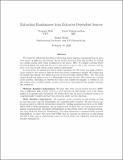Extracting Randomness from Extractor-Dependent Sources
Author(s)
Dodis, Yevgeniy; Vaikuntanathan, Vinod; Wichs, Daniel
DownloadAccepted version (583.8Kb)
Open Access Policy
Open Access Policy
Creative Commons Attribution-Noncommercial-Share Alike
Terms of use
Metadata
Show full item recordAbstract
© International Association for Cryptologic Research 2020. We revisit the well-studied problem of extracting nearly uniform randomness from an arbitrary source of sufficient min-entropy. Strong seeded extractors solve this problem by relying on a public random seed, which is unknown to the source. Here, we consider a setting where the seed is reused over time and the source may depend on prior calls to the extractor with the same seed. Can we still extract nearly uniform randomness? In more detail, we assume the seed is chosen randomly, but the source can make arbitrary oracle queries to the extractor with the given seed before outputting a sample. We require that the sample has entropy and differs from any of the previously queried values. The extracted output should look uniform even to a distinguisher that gets the seed. We consider two variants of the problem, depending on whether the source only outputs the sample, or whether it can also output some correlated public auxiliary information that preserves the sample’s entropy. Our results are: Without Auxiliary Information: We show that every pseudo-random function (PRF) with a sufficiently high security level is a good extractor in this setting, even if the distinguisher is computationally unbounded. We further show that the source necessarily needs to be computationally bounded and that such extractors imply one-way functions. With Auxiliary Information: We construct secure extractors in this setting, as long as both the source and the distinguisher are computationally bounded. We give several constructions based on different intermediate primitives, yielding instantiations based on the DDH, DLIN, LWE or DCR assumptions. On the negative side, we show that one cannot prove security against computationally unbounded distinguishers in this setting under any standard assumption via a black-box reduction. Furthermore, even when restricting to computationally bounded distinguishers, we show that there exist PRFs that are insecure as extractors in this setting and that a large class of constructions cannot be proven secure via a black-box reduction from standard assumptions.
Date issued
2020Department
Massachusetts Institute of Technology. Computer Science and Artificial Intelligence Laboratory; Massachusetts Institute of Technology. Department of Electrical Engineering and Computer ScienceJournal
Lecture Notes in Computer Science (including subseries Lecture Notes in Artificial Intelligence and Lecture Notes in Bioinformatics)
Publisher
Springer International Publishing
Citation
Dodis, Yevgeniy, Vaikuntanathan, Vinod and Wichs, Daniel. 2020. "Extracting Randomness from Extractor-Dependent Sources." Lecture Notes in Computer Science (including subseries Lecture Notes in Artificial Intelligence and Lecture Notes in Bioinformatics), 12105 LNCS.
Version: Author's final manuscript
ISSN
0302-9743
1611-3349